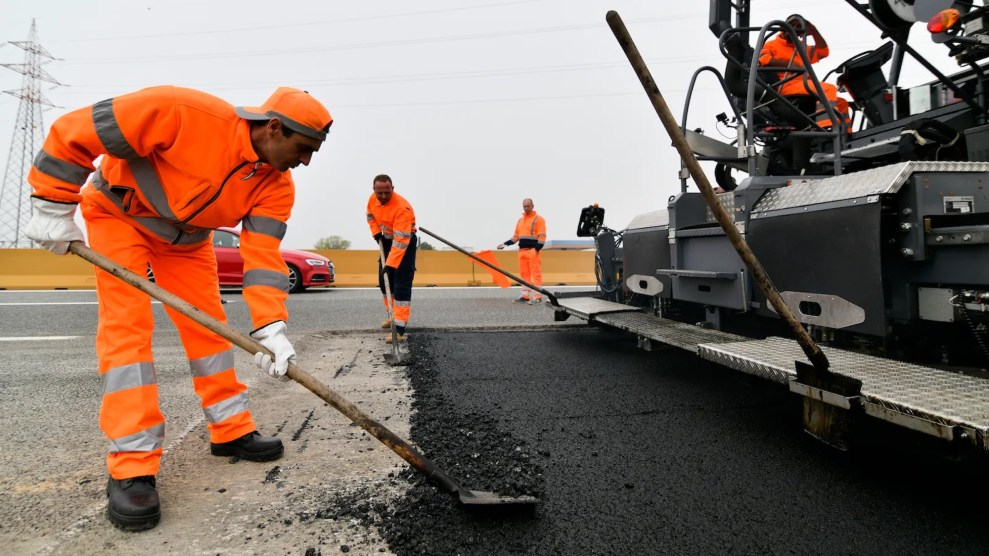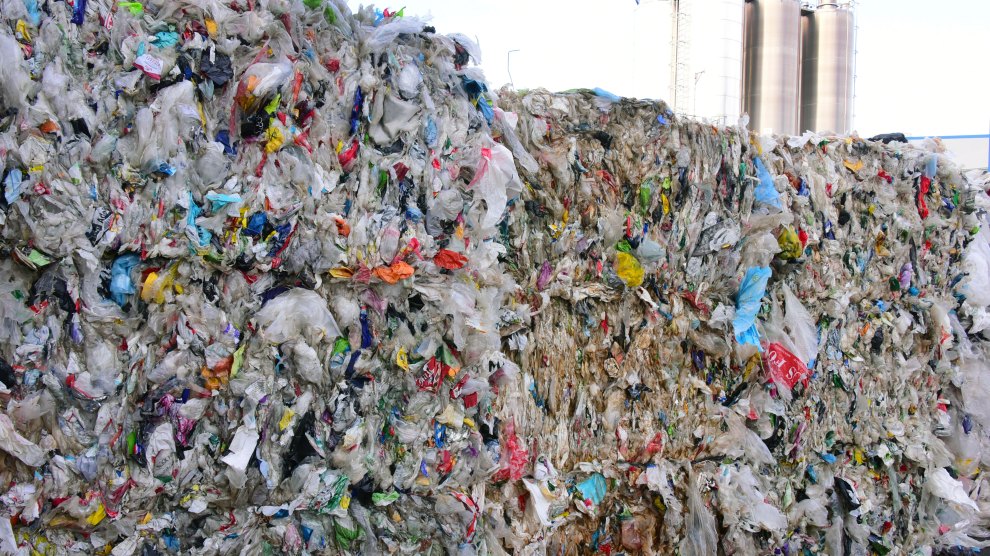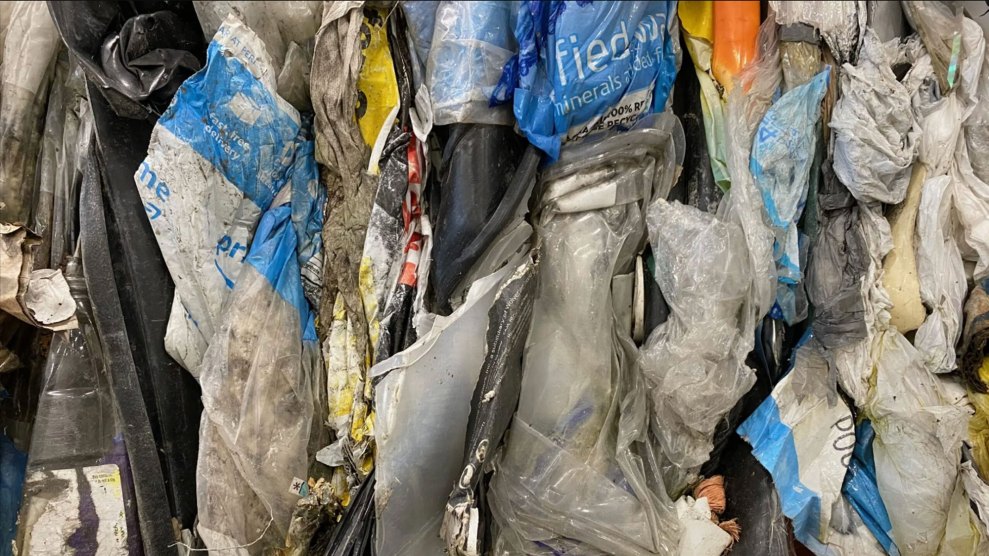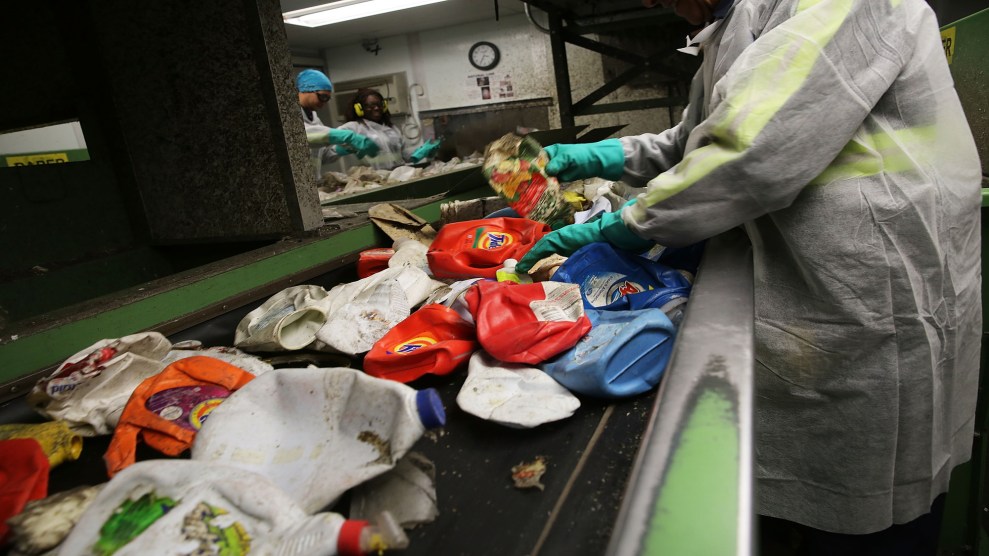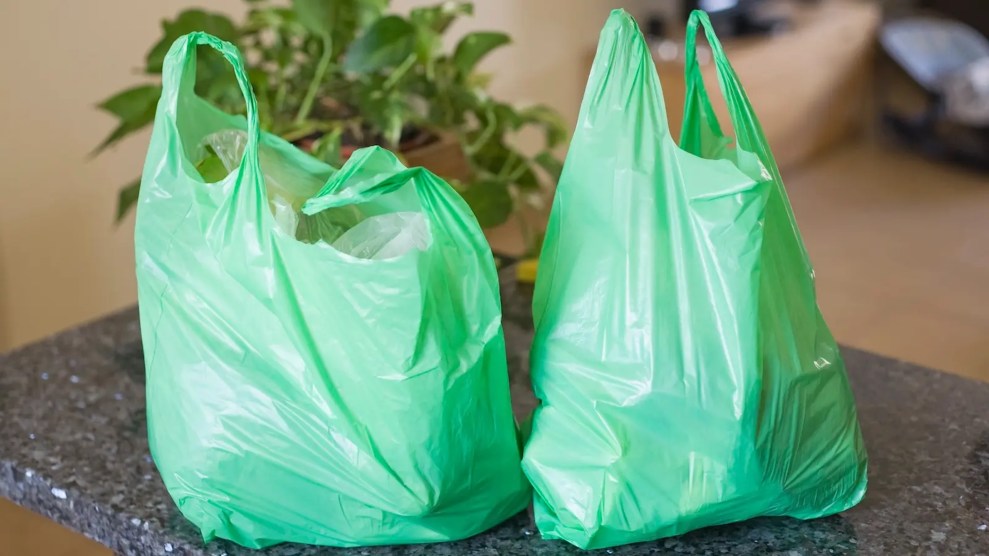
Alex Bramwell/Getty/Grist
This story was originally published by Grist and is reproduced here as part of the Climate Desk collaboration.
Over the past several years, US cities and states have passed hundreds of policies restricting the sale and distribution of single-use plastic bags. A new report says these laws have largely succeeded in their goal of reducing plastic bag use. The report—copublished by three nonprofits, Environment America, US Public Interest Research Group Education Fund, and Frontier Group—draws on industry and government data to suggest that plastic bag bans can eliminate nearly 300 single-use plastic bags per person per year.
“The bottom line is that plastic bag bans work,” said Faye Park, president of the US PIRG Education Fund, in a statement. “People realize quickly it’s easy to live without plastic bags and get used to bringing a bag from home or skipping a bag when they can.”
The report looked at plastic bag bans nationwide but focused on five representative policies in New Jersey; Vermont; Philadelphia; Portland, Oregon; and Santa Barbara, California. New Jersey’s, enacted in 2022, has had the greatest impact, eliminating more than 5.5 billion plastic bags annually. Policies in the other jurisdictions eliminated between about 45 million and 200 million plastic bags per year, depending on population size. The researchers arrived at their estimates using data collected by municipal agencies, academics, and plastics and grocery industry groups.
In total, there are more than 500 citywide ordinances banning plastic bags in the US, as well as 12 statewide bans — in California, Colorado, Connecticut, Delaware, Hawai‘i, Maine, New Jersey, New York, Oregon, Rhode Island, Vermont, and Washington. New bills could soon add Georgia and Massachusetts to that list.
The case against plastic bags is simple. They cause pollution at every stage of their lifespan, starting with the extraction of the oil and gas that’s used to make them. They cannot be recycled; after being used just once — for an average of about 12 minutes, according to one estimate—they are either incinerated or sent to a landfill, where they can last for hundreds of years.
Notoriously, bags can also become litter that pollutes the natural environment and kills wildlife. Plastic bags, alongside plastic films, cause more deaths of sea turtles, whales, dolphins, and porpoises than any other kind of plastic. They can also shed tiny fragments called microplastics, exposure to which may be linked to metabolic disorder, neurotoxicity, and reproductive damage in humans, among other health problems.
“It feels like there’s a study a week showing that plastics are not just littering and polluting the environment, but digging into our bloodstream,” said Janet Domenitz, executive director of the nonprofit MassPIRG, the Massachusetts branch of the Public Interest Research Group. Plus, microplastics release greenhouse gases that contribute to climate change.
Plastic bag bans have their skeptics, however, including those who believe it’s “narcissistic” to support them while still engaging in other environmentally destructive practices, like driving a gasoline-powered car. Others have argued that plastic bag bans are bad for businesses, or that they violate consumers’ freedom to choose plastic. As of 2021, 18 states had passed so-called preemption laws, preventing local governments from adopting their own bag bans.
Some researchers have counterintuitively concluded that plastic bags are good for the environment, compared to paper or canvas alternatives. One viral study from 2018 claimed that a cotton bag would have to be reused 20,000 times to offset the environmental impact of producing it, while other studies have criticized plastic bag bans for leading to a spike in the use of paper bags—which also use up resources. Research shows that paper bags take more energy and water to produce than plastic bags.
Other experts, however, say the cotton bag study makes a “false comparison” between reusable and plastic bags, failing to account for the full life cycle impacts of plastic once it is disposed of or littered into the environment. As for the plastic or paper debate, environmental groups agree that the point of a “well-designed” plastic bag ban should be to reduce disposable bag use of any kind.
“The intent of these laws isn’t to shift from a single-use bag to another single-use bag,” Celeste Meiffren-Swango, Environment America Research and Policy Center’s Beyond Plastic campaign director and a coauthor of the new report, told Grist. “Paper has its own environmental impact.” She recommended that all plastic bag bans include a 10-cent charge for paper bags to encourage customers to bring reusable alternatives.
The report also urged policymakers to ban plastic bags of any kind — not just thin ones. In some jurisdictions, it identified a “loophole” that has allowed grocery stores and other retailers to replace thin single-use plastic bags with thicker ones that are nominally reusable—even though research suggests that consumers don’t reuse the thicker bags in practice. In California, this loophole led to a net increase in the weight of plastic bags used per person between 2004 and 2021.
